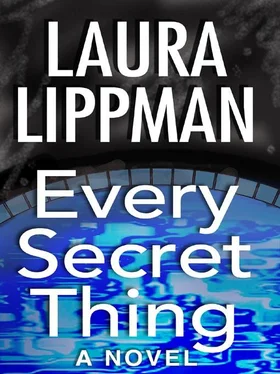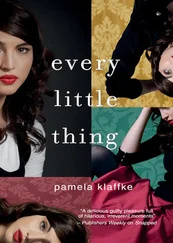The children’s librarian, who knew the Rosens well, made an announcement on the seldom-used PA system. If anyone sees a little girl with long curly hair in a green T-shirt and pink plaid pants, please bring her to the Information Desk . Yet the amplified voice could barely be heard over the buzz of the library. Ten minutes passed, fifteen, twenty. Miriam, hands shaking ever harder, insisted on calling the police despite the staff’s assurances that this happened every now and then, and the children always-always-turned up.
“Not always,” an old man muttered. “In California last week…” But no one wanted to listen to him.
The police took their time getting there. They still had not arrived when Jake had the idea of searching the lower level, used primarily for storage and the board’s monthly meetings. “There’s nothing scheduled down there today,” the children’s librarian said, “and the room is usually locked when it’s not in use.” But it was something to do, a way to keep moving forward, a way to still the doleful voices in Miriam’s head, the ones predicting the end of life as she knew it.
The three Rosens descended the stairs together, mother in the center, hand in hand. In the time it took to walk to the lower floor, Miriam saw every assumption she had made about her life torn from her. Twenty minutes ago, asked what she feared, she might have said that she hoped her children stayed away from drugs, that they would be spared cruelty, that they would go to good colleges and make happy marriages. Pressed to the outer limits of her imagination, she could have envisioned the horror of a sick child, or an injured one. But not a missing one and certainly not-but she couldn’t say it, even to herself. Don’t do this to me, she instructed God. Don’t you dare . Her nonobservant life-her so-so Seders, her refusal to fast on Yom Kippur-came back to haunt her. But even in utter despair, she could not vow to change, to love God more if he would bring her daughter back. She didn’t want to make a promise she knew she would forget to keep.
“Mom-” It was Jake, his voice careful. “You’re muttering.”
At the bottom of the stairs, they found themselves in a small foyer. Miriam reached out and placed a palm on the double doors that faced them, the way you were supposed to do in a fire. The doors were cool to the touch. She pulled and they balked, seemingly locked. But she yanked on them again, and the sticky lock disengaged, opening to reveal an empty meeting space.
Adrien was sitting quietly on the floor in a corner of the room, a picture book in her lap, other books scattered around her in a haphazard semicircle.
“Baby,” Miriam said, running toward her, arms outstretched.
Adrien frowned and sat where she was. “ Not baby,” she corrected.
“Why are you down here? How did you get here?” Miriam had pressed the girl so hard to her shoulder that she couldn’t answer until she wiggled around, freeing her mouth.
“Lady said.”
“What lady? One of the librarians?” Miriam indicated the staff members who had crept down the stairs behind her.
Adrien studied them gravely, then shook her head. Because of her long amber curls and green eyes, she was used to admiring glances, but she had never had so many people watching her at once. She seemed to like it.
“Gone,” she said, with a dramatic sweep of her chubby little arm. “Lady gone.”
The police arrived as the Rosens were gathering their things. Miriam made a report only because she felt so sheepish. If she didn’t make a report, then she was a silly hysteric who had acted on groundless fears. A report made it true. She told the officer that she had left the baby under Sascha’s supervision-not to blame Sascha, she told herself, but to establish a record, in case it happened again. Someone had lured her daughter to that basement room, probably some dotty old lady. Still, she wouldn’t want another family to experience the panic she had just known. And there was the question of how the room had come to be unlocked, which seemed to bother the library staff even more than Adrien’s disappearance.
“It hasn’t been used since the library board met there yesterday,” the children’s librarian kept saying, “and the library board is not inclined to be careless about such things.”
“All’s well that ends well,” Miriam said, unashamed of the cliché. “I just want it on the record in case anything like this happens again.”
The young officer studied Adrien for a few seconds.
“Her shirt,” he said, “was it always on inside out?”
It was only then that Miriam noticed the seams, visible on the shoulders of the long-sleeved T-shirt that Adrien had insisted on wearing despite the day’s heat. Yes, there were the grass-green machine stitches, which looked like little surgical scars. The pink plaid pants were on right side out, though, and the shoes were still tied in Miriam’s distinctive rabbit ear. She was glad, looking at those shoes, that she had developed this silly way of tying shoes. If her daughter’s shoes had not been removed, then her pants had not come off. If the pants had not come off…then Miriam never had to think of this again.
Only she did. And when she did, she thought of the day as the knot on a piece of embroidery thread. The needle had poked through the muslin and was anchored in place by a strong knot, tight as a fist. But until it poked back through, creating that first small stitch, there could be no pattern. There was only a knot, a beginning, hidden on the other side of the cloth.
“Where’s the baby, Mom?” Alice asked Helen at breakfast. She had the “Lifestyles” section of the Beacon-Light propped up on the sugar dispenser, turned to the comics and horoscope.
“What?” Helen’s voice was sharp, her morning tone. “What baby? What are you talking about?”
“The doll’s head, the one that used to sit in the middle of your cut-glass saltcellars. I just noticed it’s not on the shelf anymore.” Alice pointed her forkful of fried egg at the wall next to the kitchen window, where painted shelves held the things Helen had started and stopped collecting over the years-saltcellars, vintage salt and pepper shakers, cobalt blue glassware.
“Oh.” Helen had a habit of touching her own face, her hair, her neck-not the usual pats and rubs that people used to put things back in place, but lingering strokes with her fingertips. She drew the skin of her forehead up and into her hairline, smoothing the furrows in her brow. “I got tired of it. It was too…precious. Like the time I nailed the old wedding dress to the wall. Remember that? The wedding dress on one wall, the black cocktail dress on the other.”
Alice did remember. She had an even clearer memory of the shoes that Helen had nailed below the dresses, the white and black pumps. The white ones had been attached to the wall sole down, side by side, prim and proper. The black spike heels had been driven into the wall through the vamps, so the phantom wearer appeared to be spread-eagled. There had been a pair of long black gloves as well, thrown wide, as if a singer were finishing a song. Helen had told people it was an artwork titled Madonna versus Whore, Part I. Young as Alice must have been at the time-seven, maybe eight-she had understood there would never be a Part II.
“Now that everyone else is doing stuff like that, it’s not so much fun,” Helen said on a yawn. She had slept late, as was her habit on Saturdays and Sundays, coming down at noon in her yellow silk robe, uncovered at the Dreamland vintage store years ago, back when most people were a little afraid to go down to that part of Baltimore. “I can’t run with the herd, you know.”
Читать дальше












